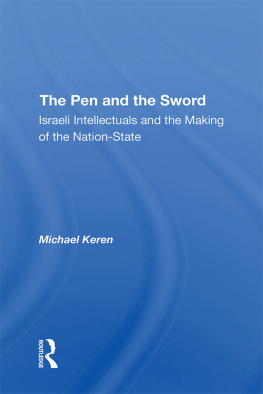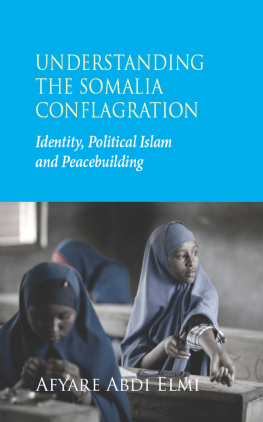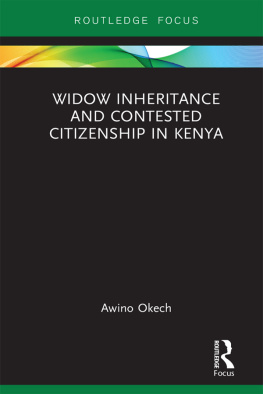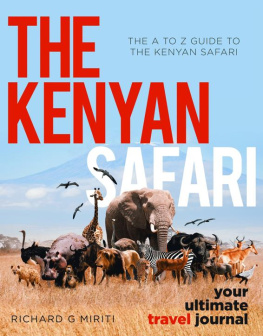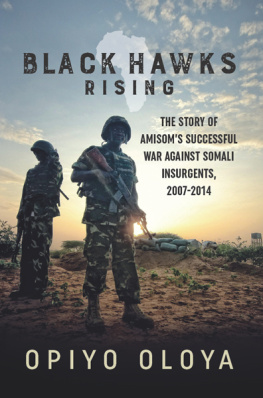NEW AFRICAN HISTORIES
SERIES EDITORS: JEAN ALLMAN, ALLEN ISAACMAN, AND DEREK R. PETERSON
Books in this series are published with support from the Ohio University Center for International Studies.
David William Cohen and E. S. Atieno Odhiambo, The Risks of Knowledge
Belinda Bozzoli, Theatres of Struggle and the End of Apartheid
Gary Kynoch, We Are Fighting the World Stephanie Newell, The Forgers Tale
Jacob A. Tropp, Natures of Colonial Change
Jan Bender Shetler, Imagining Serengeti
Cheikh Anta Babou, Fighting the Greater Jihad
Marc Epprecht, Heterosexual Africa?
Marissa J. Moorman, Intonations Karen E. Flint, Healing Traditions
Derek R. Peterson and Giacomo Macola, editors, Recasting the Past
Moses E. Ochonu, Colonial Meltdown
Emily S. Burrill, Richard L. Roberts, and Elizabeth Thornberry, editors, Domestic Violence and the Law in Colonial and Postcolonial Africa
Daniel R. Magaziner, The Law and the Prophets
Emily Lynn Osborn, Our New Husbands Are Here
Robert Trent Vinson, The Americans Are Coming!
James R. Brennan, Taifa
Benjamin N. Lawrance and Richard L. Roberts, editors, Trafficking in Slaverys Wake
David M. Gordon, Invisible Agents
Allen F. Isaacman and Barbara S. Isaacman, Dams, Displacement, and the Delusion of Development
Stephanie Newell, The Power to Name Gibril R. Cole, The Krio of West Africa
Matthew M. Heaton, Black Skin, White Coats
Meredith Terretta, Nation of Outlaws, State of Violence
Paolo Israel, In Step with the Times
Michelle R. Moyd, Violent Intermediaries
Abosede A. George, Making Modern Girls
Alicia C. Decker, In Idi Amins Shadow
Rachel Jean-Baptiste, Conjugal Rights
Shobana Shankar, Who Shall Enter Paradise?
Emily S. Burrill, States of Marriage
Todd Cleveland, Diamonds in the Rough
Carina E. Ray, Crossing the Color Line
Sarah Van Beurden, Authentically African
Giacomo Macola, The Gun in Central Africa
Lynn Schler, Nation on Board
Julie MacArthur, Cartography and the Political Imagination
Abou B. Bamba, African Miracle, African Mirage
Daniel Magaziner, The Art of Life in South Africa
Paul Ocobock, An Uncertain Age
Keren Weitzberg, We Do Not Have Borders
Ohio University Press, Athens, Ohio 45701
ohioswallow.com
2017 by Ohio University Press
All rights reserved
To obtain permission to quote, reprint, or otherwise reproduce or distribute material from Ohio University Press publications, please contact our rights and permissions department at (740) 593-1154 or (740) 593-4536 (fax).
Sections of this book have appeared in the Journal of African History, the Journal of Northeast African Studies, and the book Kenya after Fifty: Reconfiguring Historical, Political, and Policy Milestones.
All the maps in this book were made by Jacob Riley.
Printed in the United States of America
Ohio University Press books are printed on acid-free paper.

27 25 24 23 22 21 20 19 18 17 5 4 3 2 1
Library of Congress Cataloging-in-Publication Data
Names: Weitzberg, Keren, author.
Title: We do not have borders : greater Somalia and the predicaments of belonging in Kenya / Keren Weitzberg.
Other titles: New African histories series.
Description: Athens : Ohio University Press, 2017. | Series: New African histories | Includes bibliographical references and index.
Identifiers: LCCN 2017018265 | ISBN 9780821422588 (hc : alk. paper) | ISBN 9780821422595 (pb : alk. paper) | ISBN 9780821445952 (pdf)
Subjects: LCSH: Somali diaspora. | SomalisKenya. | NationalismKenya. | Kenya--Ethnic relationsHistory.
Classification: LCC DT433.545.S75 W45 2017 | DDC 305.8935406762dc23
LC record available at https://lccn.loc.gov/2017018265
Preface and Acknowledgments
THIS WORK DRAWS UPON MULTIPLE archives. Between 2008 and 2014, I carried out research at the British National Archives (TNA) in London, the Kenya National Archives (KNA) in Nairobi, and the Hoover Institution at Stanford. From all of these places, I collected a wide variety of colonial and postcolonial government documents. In addition, I have made use of non-archival written records, such as newspaper articles, traveler accounts, settler memoirs, and NGO reports. Between September 2010 and September 2011shortly before the Kenyan invasion of SomaliaI also conducted over one hundred formal interviews in linguistically and culturally diverse sites in the Central and Rift Valley regions of Kenya and the Somalia/Kenya borderlands.
The staff at the Kenya National Archives greatly facilitated my research. Special thanks are due to Richard Ambani, who has generously supported many researchers and scholars over his years working at the KNA. My fieldwork would have been impossible without the help of multiple research assistants in different locations and at different stages of the project. Hassan Kochore and Hassan Ibrahim Hassan aided me during the initial, exploratory stages. Abdi Billow Ibrahim and Ibrahim Abdikarim were indispensable during the main phase of my fieldwork. Together, we conducted interviews during which we collected poetry, genealogies, oral traditions, and life histories in Swahili, English, Somali, and occasionally Borana. Many of the poems recounted to me had not previously been put down in writing, to the best of my knowledge. I also had many informal conversations with Kenyan and Somali acquaintances and friends. These conversations informed my thinking in significant ways and left silent traces on my analyses that are difficult to cite or acknowledge directly.
I am deeply indebted to the many people who generously shared aspects of their lives with me, including very painful memories of warfare and state repression. I hope that I have done justice to their history. I also owe a debt of gratitude to the many people in Kenya who extended their hospitality to me and provided me with assistance during my research. They are too numerous to name, but special thanks are due to Hassan Ibrahim Hassan, Fatuma Ibrahim Ali, Ahmed Maalin Abdalle, Abdi Ahmed Ali, Amina Kinsi, Abdi Billow Ibrahim, and Mohamed Ibrahim.
While I interviewed a diverse sample of people, it goes without saying that I cannot tell all possible stories. John Jackson has suggested that rather than thinking in terms of mastery over the other, of a complete archive, or of progressively accumulating knowledge, scholars should think in terms of thin descriptionsof multiple, sometimes incommensurable, narratives. Not all of the people I interviewed would agree with my analyses. Nor, for that matter, did Kenyans always agree on a single interpretation of historical events. Some of my interlocutors would reflect upon the past differently today than at the time of our interviews. Memories were never unmediated recollections, and present concerns figured heavily in peoples explanations of the past. While conducting interviews, I endeavored to collect a wide diversity of narratives and to remain attentive to marginal and heterodox voices. However, structures of power often constrained who could speak and be spoken to. One cannot smooth over the power dynamics involved in any kind of fieldwork. My race, comparative privilege, blind spots, ideological concerns, cultural misunderstandings, and missteps no doubt shaped the fieldwork experience in ways that were often invisible to me. My work is not a definitive or an objective version of Kenyan Somali history, nor is it a historical or ethnographic project intended to exhaust our understanding of Somali society. However, my hope is that it will serve as a contribution to the field.



